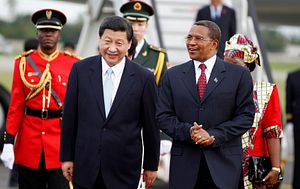To date, U.S. diplomacy has not extended to high-level summits to manage state-to-state relations with countries on the African continent. That is in stark contrast to the approach China has been taken, with its triennial Forum on China-African Cooperation (FOCAC). Now, however, the situation looks ready to change, as President Barack Obama prepares to host the leaders of 47 African countries at a landmark summit, the U.S.-Africa Leaders Summit, in Washington, D.C. on August 5 and 6 this year.
China has long maintained a very intensive dialogue with African states, managed basically on a daily basis. As a multilateral platform, FOCAC is not just a diplomatic talkfest; it is a major tool for fostering and developing Sino-African cooperation. FOCAC represents a Chinese model for cooperation that goes well beyond the summit itself, to include frequent exchanges and follow-up commitments. It can also be seen as a decisive soft power tool to help Beijing develop an attractive image across the African continent and even elsewhere.
Since the first FOCAC was held in 2000 in Beijing, China has done much to engage with Africa in a deep and continuous dialogue, and its pragmatic approach has produced some significant results. Can the U.S. catch up, especially when it comes to winning “hearts and minds” so that other policies might be implemented? As Joshua Kurlantzick, author of Charm Offensive, noted, this rise of China by the second half of 2000 was coinciding with a “sharp decline in America’s soft power,” reflecting factors such as “cuts in American public diplomacy, scandals in American corporations, misguided trade policies, [or] a retreat from multilateral institutions.”
In this increasingly multilateral and multipolar age, emerging powers attempt to pierce the center of gravity and redraw the map of influence in international affairs. China is the most likely challenger to America as the “lonely superpower,” to borrow from Samuel Huntington’s 1999 article in Foreign Affairs. It is not surprising, then, that the U.S. president finally issued an invitation to slightly more than four-fifths of the leaders of the African continent. Also not surprising, he was clear on those whom he would not welcome. Presidents Robert Mugabe of Zimbabwe and Omar al Bashir of North Sudan are pariahs for the U.S., while the representatives of Madagascar, Egypt and Guinea-Bissau will also be staying home.
Drawing on John Mearsheimer’s argument that “states seek to maximize their power,” we may argue that they not only look for hard, but increasingly soft power strategies to become more sophisticated in asserting themselves. Even when it comes to Africa, this is not the first time the president has held multilateral meetings. The presidential lunch at the United Nations in September 2009 was “designed to broaden and expand the vision for US partnership with the continent,” and was said to be the “start of a dialogue between [the first Obama] administration and African leaders.”
But while any meeting with the president of the United States is significant, in an increasingly competitive environment, dining with 25 African leaders at the United Nations may not be entirely convincing. As I have argued in the journal BiztPol Affairs, the United States should also establish a summit, which it holds every three or four years. Not a one-off event, but a series of summits, coupled with numerous business meetings with the growing involvement of the American private sector. This latter can and should be in line with the achievements of the biennial U.S.-Africa Business Summit hosted by the Corporate Council on Africa, and held for the ninth time in October 2013 in Chicago, Illinois.
Africa has been high on foreign policy agendas across the global arena for the last two decades. Japan was a pioneer with the Tokyo International Conference on African Development (TICAD), which it has held every five years since its launch in 1993. India also holds its Africa–India Forum, Singapore has its business summit with Africa, Turkey organizes the Turkey–Africa Cooperation Summit, and almost every emerging power has come up with a similar method to become (or stay) competitive for African hearts, minds, and certainly markets. Even middle-size Central European nation Hungary initiated an event under the name “Budapest Africa Forum,” which may only be a one-time show, but was a worthwhile attempt to draw (more) attention to the potentially competitive advantages of the host country.
The United States has long been lacking this foreign policy tool. The event of course is important, but so is what must come with it: follow-up meetings at the ministerial/departmental level, civil society activities, business fora, partnership building or investment opportunity workshops, and many more. All can finally contribute to a coherent U.S. Africa policy, a strategic unified government approach for long-term future purposes.
Along with this summit diplomacy, an enhanced American charm offensive can extend the range of expected economic activities. Although China has competitive offers, often as part of complex “packages,” as Raymond W. Copson, author of The United States in Africa suggests, the U.S. “can compete with China in supporting higher education for Africans through scholarships and assistance to African universities. [America] can win friends at the grass roots by fulfilling [its] promise to eliminate trade barriers […], scale up legislative, technical and medical exchanges and support infrastructure projects where there would be direct benefit to Africa’s poor.”
Courting Africa with the recent presidential invitation and strengthening the soft aspect of its strategy could help the U.S. regain momentum in its Africa diplomacy.
Istvan Tarrosy is co-editor of The African State in a Changing Global Context. Breakdowns and Transformations (Berlin, 2010), and is Assistant Professor of Political Science at the University of Pecs, Hungary. He is Fulbright Visiting Research Fellow at the Center for African Studies, University of Florida.

































